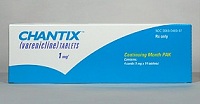 What if smokers ready to quit weren't the only market for Pfizer's Chantix? What if the company could market its smoking-cessation med to smokers who are just thinking about quitting soon?
What if smokers ready to quit weren't the only market for Pfizer's Chantix? What if the company could market its smoking-cessation med to smokers who are just thinking about quitting soon?
A much bigger patient population is what it would mean. And if the latest Chantix study data are any indication, that's just what Pfizer ($PFE) would like to have. In a study published in JAMA on Tuesday, researchers said Chantix helped smokers who'd like to stop get serious about the idea.
The Pfizer-funded study involved 1,500 patients at 61 sites, all of whom said they wanted to quit--just not yet. "Within three months" sounded like a good goal for these participants, half of whom got Chantix for 6 months, and the other placebo. Both groups got weekly counseling.
Incidentally, the study authors estimated that 14 million current smokers fit the same profile as the study participants. That's a lot of potential new patients.
The idea was for participants to cut down on smoking through the period, aiming to quit by the 12th week of drug therapy. The participants checked in weekly, to say whether they'd smoked within the past week and to have their breath tested for carbon monoxide, a marker for smoking.
At the 12-week mark, about one-third of Chantix patients hadn't smoked for the previous 7 days, compared with 6.9% of placebo patients. For Chantix patients, that percentage surpassed 40% at 16 weeks and then hovered there till after the 6 months of drug therapy ended. During the follow-up period, 7-day abstinence rates slid but remained above 30%. The pattern was slightly different for the placebo group: At the end of 24 weeks of therapy, about 18% reported that they'd abstained, and that group grew slightly after that, staying at around 20% for the rest of the study.
So, at the end of the study, there was a difference of about 15 percentage points between the placebo group and the Chantix group.
As the study authors note, current guidelines recommend "cold turkey" quitting, but many smokers don't want to stop smoking that way. Chantix "offers a treatment option" for patients who don't fit the "cold turkey" profile, they concluded. Here's the problem, though--and the study authors acknowledge it as such: The study excluded patients with a laundry list of health problems, including psychiatric problems, lung disease and heart issues. Rolling out the same treatment approach to the general smoking population could be dicey. Consider the high rate of psychiatric side effects for past Chantix users--side effects that are featured in a black-box warning on its official label.
Given the exclusions, "The generalizability of this treatment approach to a broader population of smokers who need to quit smoking but may want to achieve it through reduction is unknown," the authors wrote.
Pfizer wants that black box removed from Chantix's label, and it has been racking up study data for its case. But an FDA advisory panel voted last fall to keep that warning right where it is--at least for now. The FDA did allow Pfizer to add some favorable study data to the label that could counteract the psychiatric worries. Late this year, a postmarketing safety study will deliver some data comparing Chantix with two other stop-smoking treatments, and the panel will take another look then.
Meanwhile, Pfizer can hand out copies of the JAMA study to doctors, who might decide on their own to use Chantix as the authors did in their research. Doctors might just as well read the New York Times story about the JAMA study. Obviously, the company can't market the drug for those 14 million potential patients--unless and until it asks for and wins FDA approval.
- read the JAMA study